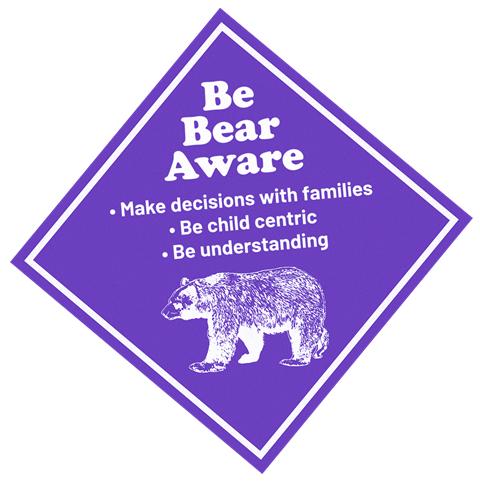Every child and young person needs support to help them learn or engage with activities. Some need additional or different support from those of the same age to ensure that everyone benefits from all they participate in. We want to address some of the important questions around these needs. Welcome to ‘All inclusive’.

As well as a trainer, speaker and writer in the field of supporting children and young people with additional needs, I’m also dad to James, who is autistic and has a range of additional needs himself. Most of the time, as parents of a child with additional needs, things work as they should. That doesn’t happen by accident, it takes a huge amount of planning and energy to ensure that everything goes smoothly, but to an unknowing onlooker everything looks under control, relatively calm, generally successful, like watching a grizzly bear fishing for salmon.
Every now and then, however, something doesn’t go as it should, somebody gets it wrong. And if in getting it wrong, they adversely affect our additional-needs child, well they’ve just given a grizzly bear a poke with a stick. Maybe that’s happened to you, and in a non-church context (thankfully) that’s what happened to us recently. In sharing our story, it might help us all to understand why sometimes parents of children and young people with additional needs can come across as a bit, well, grizzly bear!
James visits a nearby community centre every week as part of our programme of engaging him with the world and giving him a variety of opportunities for things to do. Taking the bear metaphor a bit further, it’s the equivalent of taking our (rather large) cub to the river to learn to catch fish.
James really enjoys going to the community centre, but in the few months that he has been going there his underlying anxiety prevents him from getting out of the car and going inside. So, the team have been doing an amazing job in bringing craft activities out for James to do in the car! It’s been a great demonstration of inclusion done well.
One of them brings out a tray, shows him what to do and then we support James to do the activity. When it’s done, a team member comes back out to see what James has created and to congratulate him on his excellent work. There are high-fives all round! Until a few weeks ago…

A few weeks ago, we arrived with James in the car as usual to be told that a decision had been made by ‘senior management’ that unless James was able to get out of the car and come into the centre, he would not be allowed to join in the craft club. The manager concerned, whom we had never met, had even phoned the team while on sick leave to reinforce this instruction. James couldn’t get out of the car, so he couldn’t do his craft activity.
Even though we were already there, we were not allowed to go in and collect the craft activity for him. The team were clearly very uncomfortable with this decision but weren’t willing to go against the instructions received. I didn’t blame the team, they had been put in a very difficult position. The senior manager was unavailable as she was on sick leave, but she had poked the grizzly bear.
We took a very sad James away, wondering why he couldn’t do his craft as usual – wondering why in an already tough world for young people with additional needs, someone had decided to make it a little bit tougher. We took James to get some McDonalds (via the drive-thru, he is unable to get out there either) which cheered him up a bit, and while we sat in the car eating our meal my inner grizzly bear was raging. How could they do this to my boy?
I work in this field, I know the system and the ways to get things sorted out. The good news is that after a week of working with the key people involved, being a calm but forceful grizzly bear, we got it sorted out and James is happily back at his craft club again.
Many other parents of children with additional needs find themselves in difficult situations like this too, or worse. It shouldn’t happen, but it sadly does all too often, even in church. That’s why sometimes us parents come across as grizzly bears – we have to, we don’t have a choice, it’s what we need to do for our child.
Unfortunately, not all parents know how or have the physical, mental and emotional energy or experience necessary to respond in the right way to situations like this. Some will get very angry indeed, aggressive even, while some will just not have the strength to face yet another battle and so they and their child will simply go away. Both responses are absolutely understandable and totally avoidable.
So how should we, in a church children’s and youth work context, do this better? Here’s a three-step strategy to use that can make all the difference:
Make decisions with families
Whatever you need to do, you will always get a better outcome with the input and cooperation of families, rather than making a decision in isolation and then communicating it (sometimes badly, as in the story above).
Be child centric
Place the child concerned at the heart of all conversations and decisions. What are their needs, what works best for them. Make sure the most vulnerable person in this decision is thought of first and foremost.
Be understanding
Unless you’ve got a child with additional needs it’s very difficult to know what pressures this can sometimes create for families. If a parent is being a grizzly bear, then be understanding, ask them to share with you why they feel this way, listen carefully, then work together to make things better. Don’t poke them with a stick!

































